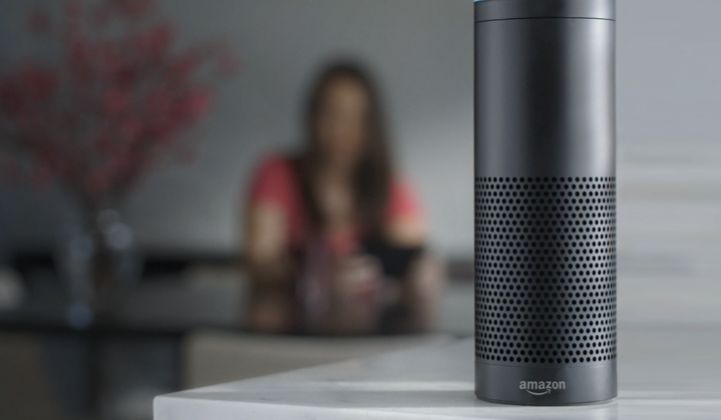The Amazon Echo smart speaker may not only prove useful for managing music playlists and ordering household items -- eventually, it could also help boost renewable energy consumption across Europe.
Availability of the $179.99 voice-activated home entertainment device in the U.K. “is really accelerating the sales of other products, like connected light bulbs [and] connected smart plugs,” said Arthur Jouannic, senior analyst at Edinburgh-based Delta Energy & Environment (Delta-ee).
Smart energy controls have so far failed to catch on because people forget about them or just can't be bothered to use them. Hooking them up to a voice-activated device such as the Echo, though, makes using the controls more convenient.
This in turn increases the flexibility of home energy use. Over time, this could help households consume a greater share of renewable energy by setting appliances to switch on when electricity demand is low and supply is high, Jouannic said.
However, “I don’t think Amazon would say that, because they have other plans,” he commented.
The link between the Echo and smart control adoption emerged in an annual Delta-ee survey of heating controls across Europe.
The study, now in its fourth year, found that just three markets -- Germany, the Netherlands and the U.K. -- account for more than 80 percent of all the estimated 3 million homes that have installed smart controls so far in Europe.
These are all markets where utilities or technology vendors are actively encouraging take-up of smart controls, Jouannic said. “To make this market happen, you need committed players, with a lot of customers, to subsidize the cost of the devices,” he said.
Each of the three main European markets for smart controls have such players, he noted. In Germany, companies such as Deutsche Telekom and RWE, through its subsidiary Innogy, were pushing the products.
In the Netherlands, support was being provided by the utility Eneco and the appliance maker Bosch. Finally, in the U.K., British Gas was leading the charge to introduce smart controls into residential households.
The actions of these companies are thought to be largely responsible for the 20 percent to 30 percent year-on-year growth in Europe’s smart control market, which covers devices ranging from internet-enabled thermostats to connected heating pipe valves.
“There is always a retail market, but that’s usually much smaller than the rest,” Jouannic said. “If you don’t have a big player pushing it’s very unlikely that the market is growing fast.”
European utilities are offering smart controls to boost loyalty, provide additional services and ultimately make up for revenues lost through competitive pricing and customer churn.
Being given a smart thermostat helps customers feel good about their utility and at the same time gives the energy provider a potential window into household consumption, which can then be used to develop further services.
For manufacturers such as Bosch, meanwhile, the aim is to corner the emerging market for smart appliances while also giving installation channel partners value-added products to offer their customers.
From a customer’s point of view, the pitch has traditionally been that smart controls can help save energy and reduce bills.
This is true, said Jouannic, but what has emerged among users so far is that they are often more interested in using the controls for comfort. For example, they want to make sure they come home to a warm house in the evening.
“It’s more the convenience and the comfort. But for the mass market, energy savings will be one of the key criteria,” he said. “We see more and more budget thermostats launching in the market.”
Seeing these installed across most of Europe’s 200 million homes will still take time. It will also require improvements in usability, since people much prefer to interact with smart controls via an app, rather than having to tinker with them directly.
This is where the Echo comes in. Currently only available in Germany and the U.K., the device already seems to be playing a part in making it easier for people to manage their smart controls, according to Jouannic’s research.
If the Echo can become an interface for smart heating controls, then it could be easier for Europeans to manage their energy consumption in a more flexible way. And that could eventually include making better use of any gluts in renewable supply.



